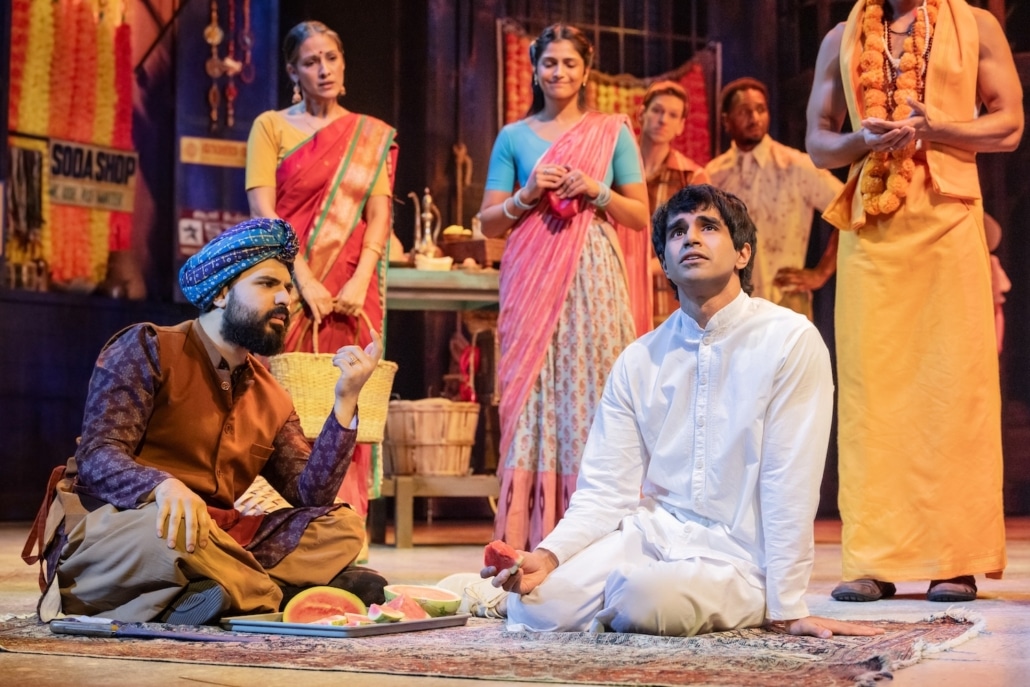DCPA NEWS CENTER
Enjoy the best stories and perspectives from the theatre world today.
Enjoy the best stories and perspectives from the theatre world today.

Pragun Bhardwaj, Taha Mandviwala and the cast of the National Tour of LIFE OF PI. Photo by Evan Zimmerman for MurphyMade, 2024
Turn off the tv and turn on the tell-a-vision!
Opalanga Pugh – Griot and Urban Storyteller – 1952-2010
Yann Martel, author of the book Life of Pi says the story can be distilled down to three ideas::
Telling stories is how we as humans make meaning of the magic and mystery of the world. It’s a way we preserve history, maintain culture, cultivate traditions, and instill values. Through stories we come to understand ourselves and others. They help us forge connections, build and nurture relationships. Stories can entertain us, educate us, elevate and inspire us. When we become engrossed in story, our brains release dopamine, oxytocin, and endorphins. Stories can just make us feel good.
No one culture has a monopoly on telling stories. Aubrey Valencia, Founder and Executive Director of The Storytellers Project, observes “Whether [people were part of] Germanic tribes in Europe or they were African or they were Native American, they all shared stories and knowledge and passed on the history of their ancestors.”
Denver’s well-established tradition of oral storytelling is reflected in a plethora of story sharing organizations. MORTIFIED is a live storytelling show where adults draw from the artifacts of their childhood to give voice to the experiences that informed who they were and who they have become. Despite the vast differences in audience members’ circumstances, producer David Blatt, regularly witnesses how storytelling draws them together. “You see someone who seems different than you, of a different location, a different gender, or skin color, he says, “but the universality of experiences leaves you feeling closer to everyone.”
The stories that people tell can be humorous or amusing, they can also be fueled by trauma. Intensely personal stories can often be moving for the audience and liberating for the storyteller. “When you finally choose to stand up and share your story in front of people, you take control of that narrative instead of that narrative having control of you,” says Valencia.
Through story, people find points of intersection and understanding. Denver writer, historian and organizer, brother jeff, says that “from a storytelling standpoint, a hope and aspiration standpoint, we are the architects of what this world is going to be.” In 1994, he founded brother jeff’s Cultural Center, a space where people are able to gather and give voice to their experience. “[People] know that brother jeff’s Cultural Center is a holy spot. It’s a place where folks who are looking for their culture can get a drink of water. They can go to the well and be authentic.”
Many performance-based organizations are still rebuilding their audiences post-COVID, however, that is not to suggest that other forms of entertainment have supplanted the need for connection and community that storytelling provides. “It’s not just that there’s electronics now, and people can watch television, and people can go to the theater,” says brother jeff. “No, that oral tradition is still so powerful.”
Rowena Alegria, former Chief Storyteller of the Denver Office of Storytelling agrees. “The audience has expanded. The stories have expanded. They bring so many different perspectives that they didn’t used to bring. There is more diversity there than there ever used to be…so many efforts that are thriving and growing.”
Many of the organizations hold space so that Denver’s diverse communities can reclaim their narratives and share their stories in ways that are authentic to their experience. “We cannot just let [our stories] be commercialized and taken away by those who have capitalized on them. We as a people have to be our own patrons of the arts as well,” says brother jeff. “We can’t be co-opted and have our stories greenlighted by folks and see if they think they’re marketable or not, or say ‘can you change these lines so that I can understand it?’”
For many storytellers, however, the personal is political. For DL Cordero, fantasy author, occasional poet, and dabbler in horror, “Drafting and creating the stories that I’m doing is my form of resistance. Imagining better futures and writing myself into the future.”
Many involved in Denver’s storytelling circuit are unsure how things will evolve under the current political administration. Ron S. Doyle, producer and co-host of “The Narrators” storytelling show noted that during President Trump’s first term, “…a lot more of storytelling shows emerged. People needed to talk about things. People needed to reconnect on a more personal level, so I’m curious to see if that’ll happen again. I think it might. I think we’re driven to.”
Cordero feels that the need for true stories representative of varied cultural experiences is even more important than ever. “There are those of us who must remember,” they say, “and there are those of us who actively try to forget, that need to forget. I think right now the pendulum is swinging towards those who want and need to forget because they can’t reconcile the past with where they live now.”
At its best, the experience of storytelling brings people together. It helps us transcend our differences and come together for the greater good. Sharing stories, I think, is how we learn to love one another,” says Denverite Suzi Q Smith – a poet, author, educator, music maker and dreamer of dreams.
Twanna LaTrice Hill is a teaching artist, actor and director who has published works of fiction and nonfiction and penned two plays that have been produced and performed in the Denver metro area. Princeton/Harvard/Regis educated and a trained Sovietologist, she is currently seeking representation for her first memoir, What’s Done in the Dark.
